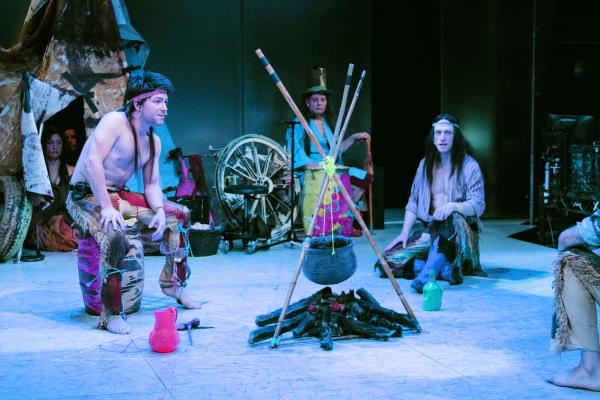Cry, Trojans!

(© Tim Hailand)
If longevity equals success in the theater world, the Wooster Group must be doing something right. The vaunted experimental theater troupe with a name befitting a hedge fund has been pushing the limits of the stage for four decades. It was one of the first companies to incorporate television screens and multimedia into its frenetic productions. (Now everyone is doing it!) Their status as trendsetters and history-makers on the American stage is undisputed. With Cry, Trojans! they return to their Brooklyn home, St. Ann's Warehouse, for the first time since 2012's Early Plays. It’s not a particularly happy homecoming, even though their odyssey began in an auspicious manner.
In 2012 the Wooster Group participated in the World Shakespeare Festival (a massive presentation of every Shakespeare play in conjunction with the London Olympics). They took on Troilus and Cressida, Shakespeare's famously problematic Trojan War play, which oscillates wildly between bawdy comedy and mythic tragedy. They played the Trojans, with members of the Royal Shakespeare Company playing the Greeks. Cry, Trojans! is essentially that production, but with the Wooster Group doing double duty, donning paper masks and exaggerated British accents during the Greek scenes.
The story bounces between the two groups, which must have offered a fascinating basis for the initial transatlantic collaboration. King Priam (Greg Mehrten) defends his city with the help of his son and greatest warrior Hector (Ari Fliakos). His youngest son Troilus (Scott Shepherd) is too enamored with Cressida (Kate Valk) to fight. But when Cressida is transferred to the Greeks in a prisoner exchange, Troilus begins to suspect her infidelity and takes up arms. Lots of people die and speechify.
Folkert de Jong and Delphine Courtillot's intricate sculptural costumes make it appear as though the actors have burst forth from their Grecian exoskeletons like thespian cicadas, ready to offer a fresh take on this 3,000-year-old tale. One wishes they would go back in when we see what emerges: white dudes in Native American drag. Yes, the actors spend the entire two and a half hours wearing feathers in their hair and buckskin pants. A giant tepee dominates the upstage wall.
Controversy has dogged the production, with some finding offense in its cavalier use of "redface.'' Indeed, if the Trojans are Native Americans and this rendition is "the Trojan side of the story" (as the marketing material describes it), it does seem self-defeating to present this narrative of the oppressed with an entirely nonnative cast. For fans of Shakespeare, however, that is far from the show's most offensive aspect.
Unfortunately, the verse is dead in the mouths of the Wooster Group, smothered by Elizabeth LeCompte's auteur staging and the affected performances of the cast. While some adopt a perpetual singsongy diction (as if reading a storybook to small children), others opt for a stereotypical "Indian voice" monotone. No one seems to understand what they are saying, especially the actors. LeCompte maintains the basic structure from Troilus and Cressida, although her blocking (characters punching imaginary walls, breaking into "Indian" dance, and running in circles like restless housecats) does little to illuminate the plot. (The synopsis in the program is far more helpful on that front.) The result is like watching a middling production of Shakespeare staged by an ambitious but misguided director.
There are bright spots: Bruce Odland's schizophrenic sound, the show's most stimulating element, blasts us with deafening chants and galloping horses. We hear the ghostly voices of the RSC actors who first portrayed the Greeks underscoring the mimicry of the Wooster Group actors now playing their roles, giving us a tiny taste of what Shakespeare should sound like. Four flat-screen TVs occupy the corners of the thrust stage, offering a constant stream of Hollywood depictions of American Indians. Andrew Schneider's videos may have been brilliantly curated, but the screens are so small and inconspicuously placed as to be rendered barely noticeable.
In the end, we have very little sense of Shakespeare's take on the Trojan War and how that reflects American imperialism or the added indignity of centuries of false depictions of native people on stage and screen. Then again, should we have expected any of that? In the play's earliest moments, Scott Shepherd informs us, "This is the story of our encounter with the Royal Shakespeare Company." It's not Troilus and Cressida or even a terribly misguided Cowboys and Indians, but the meeting of two theater companies (one avant-garde, one implacably traditionalist). Cry, Trojans!, like so much similarly "meta" theater, is self-involved and all too predictable.










